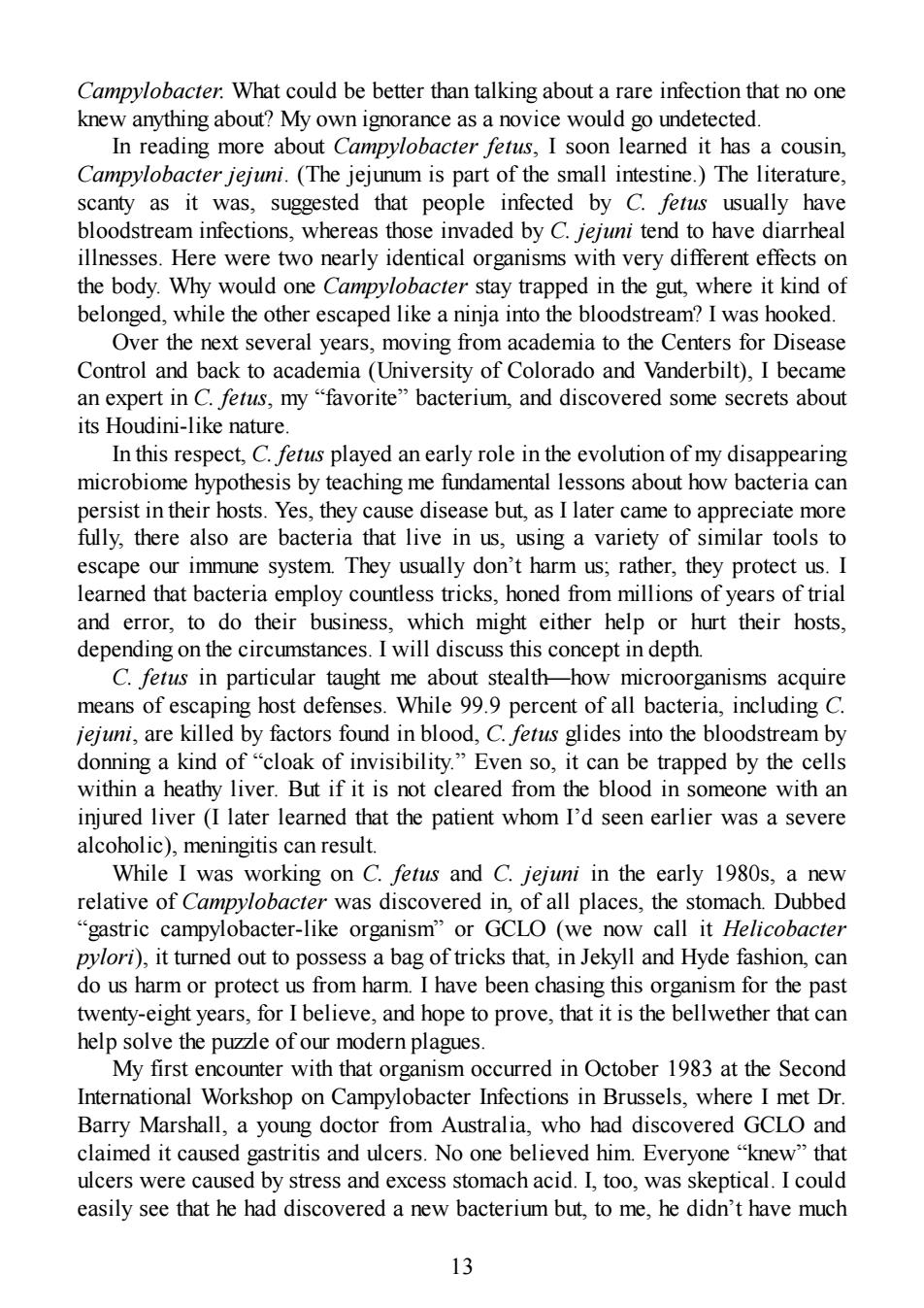正在加载图片...

Campylobacter:What could be better than talking about a rare infection that no one knew anything about?My own ignorance as a novice would go undetected. In reading more about Campylobacter fetus,I soon learned it has a cousin. Campylobacter jejuni.(The jejunum is part of the small intestine.)The literature, scanty as it was,suggested that people infected by C.fetus usually have bloodstream infections,whereas those invaded by C.jejuni tend to have diarrheal illnesses.Here were two nearly identical organisms with very different effects on the body.Why would one Campylobacter stay trapped in the gut,where it kind of belonged,while the other escaped like a ninja into the bloodstream?I was hooked. Over the next several years,moving from academia to the Centers for Disease Control and back to academia(University of Colorado and Vanderbilt),I became an expert in C.fetus,my "favorite"bacterium,and discovered some secrets about its Houdini-like nature In this respect,C.fetus played an early role in the evolution of my disappearing microbiome hypothesis by teaching me fundamental lessons about how bacteria can persist in their hosts.Yes,they cause disease but,as I later came to appreciate more fully,there also are bacteria that live in us,using a variety of similar tools to escape our immune system.They usually don't harm us;rather,they protect us.I learned that bacteria employ countless tricks,honed from millions of years of trial and error,to do their business,which might either help or hurt their hosts, depending on the circumstances.I will discuss this concept in depth C.fetus in particular taught me about stealth-how microorganisms acquire means of escaping host defenses.While 99.9 percent of all bacteria,including C jejuni,are killed by factors found in blood.C.fetus glides into the bloodstream by donning a kind of"cloak of invisibility."Even so,it can be trapped by the cells within a heathy liver.But if it is not cleared from the blood in someone with an injured liver(I later learned that the patient whom I'd seen earlier was a severe alcoholic).meningitis can result. While I was working on C.fetus and C.jejuni in the early 1980s,a new relative of Campylobacter was discovered in,of all places,the stomach.Dubbed "gastric campylobacter-like organism"or GCLO (we now call it Helicobacter pylori),it turned out to possess a bag of tricks that,in Jekyll and Hyde fashion,can do us harm or protect us from harm.I have been chasing this organism for the past twenty-eight years,for I believe,and hope to prove,that it is the bellwether that can help solve the puzzle of our modern plagues My first encounter with that organism occurred in October 1983 at the Second International Workshop on Campylobacter Infections in Brussels,where I met Dr. Barry Marshall,a young doctor from Australia,who had discovered GCLO and claimed it caused gastritis and ulcers.No one believed him.Everyone "knew"that ulcers were caused by stress and excess stomach acid.I,too,was skeptical.I could easily see that he had discovered a new bacterium but,to me,he didn't have much 13 Campylobacter. What could be better than talking about a rare infection that no one knew anything about? My own ignorance as a novice would go undetected. In reading more about Campylobacter fetus, I soon learned it has a cousin, Campylobacter jejuni. (The jejunum is part of the small intestine.) The literature, scanty as it was, suggested that people infected by C. fetus usually have bloodstream infections, whereas those invaded by C. jejuni tend to have diarrheal illnesses. Here were two nearly identical organisms with very different effects on the body. Why would one Campylobacter stay trapped in the gut, where it kind of belonged, while the other escaped like a ninja into the bloodstream? I was hooked. Over the next several years, moving from academia to the Centers for Disease Control and back to academia (University of Colorado and Vanderbilt), I became an expert in C. fetus, my “favorite” bacterium, and discovered some secrets about its Houdini-like nature. In this respect, C. fetus played an early role in the evolution of my disappearing microbiome hypothesis by teaching me fundamental lessons about how bacteria can persist in their hosts. Yes, they cause disease but, as I later came to appreciate more fully, there also are bacteria that live in us, using a variety of similar tools to escape our immune system. They usually don’t harm us; rather, they protect us. I learned that bacteria employ countless tricks, honed from millions of years of trial and error, to do their business, which might either help or hurt their hosts, depending on the circumstances. I will discuss this concept in depth. C. fetus in particular taught me about stealth—how microorganisms acquire means of escaping host defenses. While 99.9 percent of all bacteria, including C. jejuni, are killed by factors found in blood, C. fetus glides into the bloodstream by donning a kind of “cloak of invisibility.” Even so, it can be trapped by the cells within a heathy liver. But if it is not cleared from the blood in someone with an injured liver (I later learned that the patient whom I’d seen earlier was a severe alcoholic), meningitis can result. While I was working on C. fetus and C. jejuni in the early 1980s, a new relative of Campylobacter was discovered in, of all places, the stomach. Dubbed “gastric campylobacter-like organism” or GCLO (we now call it Helicobacter pylori), it turned out to possess a bag of tricks that, in Jekyll and Hyde fashion, can do us harm or protect us from harm. I have been chasing this organism for the past twenty-eight years, for I believe, and hope to prove, that it is the bellwether that can help solve the puzzle of our modern plagues. My first encounter with that organism occurred in October 1983 at the Second International Workshop on Campylobacter Infections in Brussels, where I met Dr. Barry Marshall, a young doctor from Australia, who had discovered GCLO and claimed it caused gastritis and ulcers. No one believed him. Everyone “knew” that ulcers were caused by stress and excess stomach acid. I, too, was skeptical. I could easily see that he had discovered a new bacterium but, to me, he didn’t have much 13